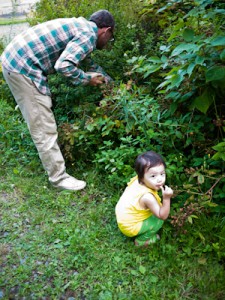Dear Dadwagon,
 As Theodore rightly noted, last week I committed the apparently unpardonable sin of taking my family not just on vacation but entirely off the grid. Up in mid-coast Maine, we had no phone (neither cell nor land line) nor Internet access, unless we wanted to drive 15 minutes to leech Wifi from the local public library. Oh, there were moments, when we were passing through more civilized zones, when our iPhones would suddenly buzz to life and download 60 or 70 important messages, but for the most part, we had to survive as our forefathers did, with only automobiles, a modern kitchen, indoor plumbing (including a jacuzzi tub), a gas grill on the porch, satellite TV, a plethora of farm stands and seafood markets, and a view of the water. In other words, totally roughing it.
As Theodore rightly noted, last week I committed the apparently unpardonable sin of taking my family not just on vacation but entirely off the grid. Up in mid-coast Maine, we had no phone (neither cell nor land line) nor Internet access, unless we wanted to drive 15 minutes to leech Wifi from the local public library. Oh, there were moments, when we were passing through more civilized zones, when our iPhones would suddenly buzz to life and download 60 or 70 important messages, but for the most part, we had to survive as our forefathers did, with only automobiles, a modern kitchen, indoor plumbing (including a jacuzzi tub), a gas grill on the porch, satellite TV, a plethora of farm stands and seafood markets, and a view of the water. In other words, totally roughing it.
What struck me most out there was how different the experience of nature is in the countryside versus the city. Here in New York, we have a couple of great parks—Prospect and Central, duh—but what they provide is not exactly unmediated access to Nature. Rather, they give New Yorkers what we don’t have at home: space. The Great Lawn is our collective backyard, the Long Meadow an extra living room, the bandshells our home theaters. Sure, there are trees, and even “woods,” but despite Olmsted’s genius you never feel like you’re anywhere but a park. Wilderness, this ain’t, and the occasional appearance of a bird of prey or coyote only underscores the parks’ constructed atmosphere.
Compare this with the relative simplicity of our temporary backyard in Maine. Every morning and evening, Sasha and I would scour the blackberry bushes to pick fresh fruit—me trying to instruct her in the difference between black, red, and white berries, and her failing to understand—and in the afternoons, we’d run around on the lawn, finding and chasing bugs, or plucking tiny wild carrots from the earth. We went for walks on Audubon trails and swam in ponds. Sasha pointed out birds and bumblebees, her eyes infinitely sharper than her parents’. I helped her feel soft lichens in the woods and hold sea snails in tidal pools. The variety and, almost more important, the ubiquity of this environment was stunning.
Almost as surprising was that Sasha was primed for this sort of thing. She may be a city kid by birth, but she can’t tell a brownstone from a tenement, or a hydrant from a sprinkler. Taxis, garbage trucks, fire engines—they’re all “cars” to her. But she knows animals—ducks and elephants, monkeys and ants—and is fascinated by flowers, leaves, and trees. She loves water, whether it’s spurting from a spigot in Carroll Park or stretching off into the distance up in Maine. She signs “wind” when it’s windy, and sings a song called “Sunny Day.”
Some of this, weirdly enough, she’s learned from TV and various iPhone applications—which I guess isn’t really that weird. Here in the city, we are always substituting the virtual for the real (think of the intangible advantages we cite when we defend our decision to live in the most expensive place in America), often with the tacit admission that one isn’t quite as good as the other. But it’s nice to know that this isn’t an either/or proposition, and that real/virtual and rural/urban aren’t oppositions but symbiotic. But we’ll save Sasha’s lesson in symbiosis for next summer.

Sounds amazing. My family went up to the coast of Maine every year when i was growing up. BEFORE there were cell phones and internet to escape. It has a special place in my heart.
My all time favorite town is Camden. The best part of Maine is how ubiquitous are the lovely views. You could drive for hours and just stare at the mountains and the coast. Even driving through Bath at night is cool with the lights on full-blast at the shipworks.